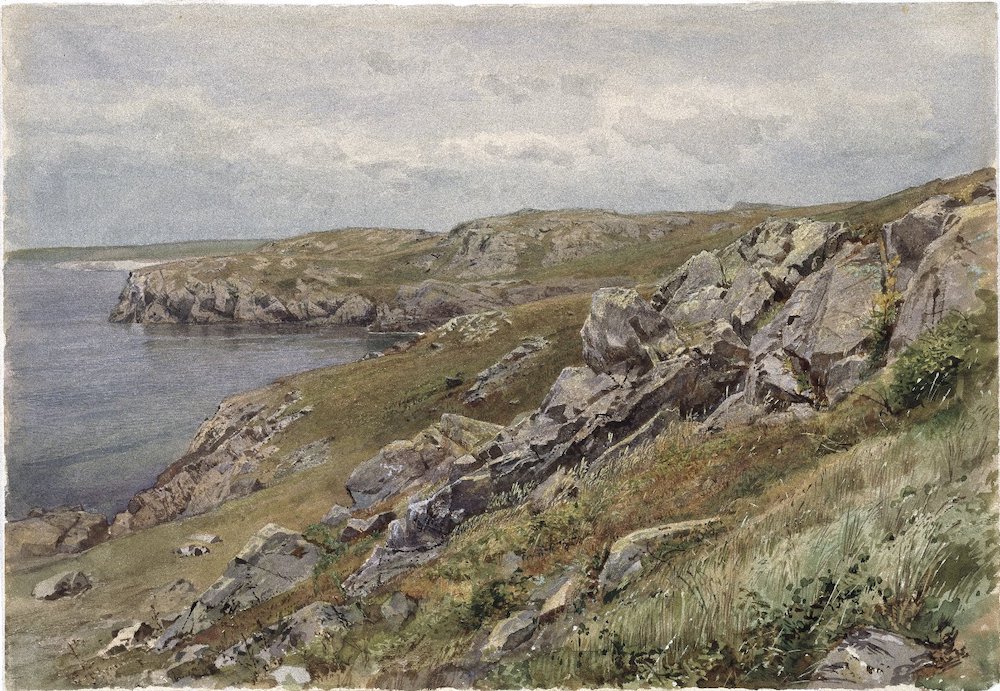The topic of night terrors has come up in a slew of my conversations lately. In part, this is due to the fact that I’ve been hanging out with a precocious two-year-old with rare but potent insomniac nights. But I also have Nicole Claveloux to thank for my current fixation on hypnagogic hallucinations, those surreal visions that crop up at the threshold of consciousness. Claveloux’s graphic short stories from the late seventies, originally written in French and published for the first time in English in 2017 as The Green Hand and Other Stories, are not literal renderings of night terrors. But the comics are nightmarish in the best sense—absurd, sharply funny, visceral, revealing. I read the collection in one big gulp, prickling with affection for the band of outsiders that populates its pages: a root vegetable with aspirations of becoming a panther, a misanthropic bird, a talking houseplant, a devilishly clever kid on the cusp of puberty. —Jay Graham
Matt Mitchell is one of the most exciting pianists and composers in contemporary jazz—to my ear, at least. He herds chaos into the corral of his compositions with great precision. The new box set Snark Horse is the six-disc culmination of a project he and his partner, the drummer Kate Gentile—who has developed her playing such that it can accommodate lots of musical corners, dead ends, and abrupt pauses—have been working at for years. It’s a book of one-measure compositions, each of which has just enough room for a hint of melody, that repeat and morph and fly out of control at the hands of their large ensemble. Imagine John Zorn’s Masada compositions but intentionally broken. It’s fine to drop the proverbial needle anywhere in this sea of mostly discordant music; it’s challenging listening, sometimes grating, though often very exciting. After many listens, I’m still sorting out what the point of it is. I suspect it will keep me occupied for years. —Craig Morgan Teicher
The appeals of the television show Ted Lasso, whose second season premiered a couple of weeks ago on Apple TV+, are simple: the characters are charming, the jokes stack to satisfying payoffs, and the sports action snaps with an appropriate tension and speed. The title character, played by Jason Sudeikis, is a chipper, mustachioed fish out of water, an American football coach conscripted to lead a failing British soccer team. I watched much of the first season while I was very ill—perhaps the perfect conditions for consuming a show that goes down with the sweet smoothness of amoxicillin. —Brian Ransom
The indie rock band Life without Buildings made only one album, 2001’s Any Other City. It’s ten songs, forty-four minutes and change. That’s less than many of us spend getting to work every morning. Each song is a little upbeat, a little moody. The band’s vocalist, Sue Tomkins, adds a forcefully girlish tone, with lines repeated to keep tempo with the drums. By being totally undemanding, this brief moment in the long history of Scottish music is an absolutely perfect capsule of feeling. —Lauren Kane
In 1643, several years after the Massachusetts Bay Colony expelled him for his intractable views about freedom of conscience and fairness of land grabs, the Reverend Roger Williams published A Key into the Language of America. Part phrase book, part ethnography, the book is a rare document of the Narragansett people before King Philip’s War. It seems unique in its attention to and relative respect for the Narragansett, who saved Williams’s life when Boston kicked him out, but “relative” is an important qualifier. In 2019, the Tomaquag Museum offered a new edition of Williams’s Key, edited by a group of scholars, elders, and culture bearers who, via footnotes, coolly take the old Reverend to task on major issues—for example, his use of the word barbarians and his belief that drums are an English invention—and offer thoughtful context for his observations and misunderstandings. Importantly, they also standardize spellings and punctuation, without which few would dare attempt ys olde Englifh book. The Tomaquag edition of the Key, a dialogue between Williams and the descendants of the people he wrote about nearly five centuries ago, is a thrill to read—an exciting introduction to America’s language and a gift to anyone seeking a more complete American history. —Jane Breakell

William Trost Richards, Rhode Island Coast: Conanicut Island, ca. 1880, transparent watercolor with touches of opaque watercolor on cream, moderately thick, slightly textured wove paper, 10 x 14 3/8. Public domain, via Wikimedia Commons.
from The Paris Review https://ift.tt/3jKvPvR


Comments
Post a Comment